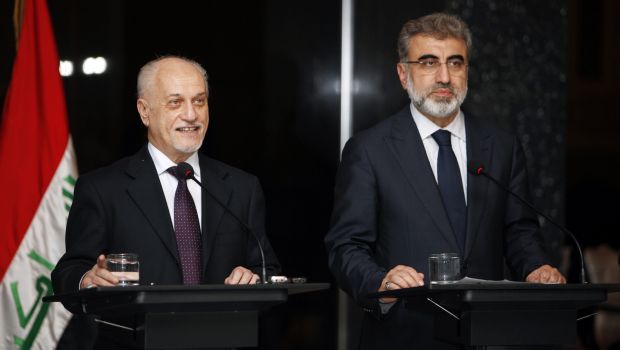
Iraq’s Deputy Prime Minister for Energy, Hussain Al-Shahristani (L), speaks during a joint news conference with Turkey’s Energy Minister Taner Yildiz in Baghdad December 1, 2013. (REUTERS/Ahmed Saad)
Baghdad, Asharq Al-Awsat—Iraq’s central government rejected attempts to include it in a trilateral committee to discuss oil exports from the Kurdistan region through Turkey on Monday, following the signing of an export agreement between the Kurdistan Regional Government and Ankara last week without approval from Baghdad.
A spokesman for Iraq’s Deputy Prime Minister for Energy, Hussain Al-Shahristani, said that the minister had rejected involvement in the committee at a meeting in Baghdad with Turkish energy minister Taner Yildiz.
This marks the latest twist in a long-running tug-of-war between Iraq’s central government and Kurdish leaders in the northern provinces over who has the ultimate authority over oil exports from the region.
Faisal Abdallah, a spokesman for Shahristani’s office, told Asharq Al-Awsat that “Iraq said it did not object to the export of oil from Kurdistan as long as the process takes place under the supervision of the Federal Oil Ministry, represented by the SOMO Oil Company, and on condition that export quantities are declared and all funds are deposited in the Iraq Development Fund, to be distributed among all Iraqi people.”
“Shahristani stressed the Iraqi government’s commitment to the Iraqi constitution, and that oil is a wealth for all Iraqis, and that there must be standards and regulations for export supervised exclusively by SOMO,” he added.
Following the meeting, Shahristani announced an agreement with Turkey not to export Iraqi oil through its territory without the consent of the Iraq government. He also pointed to a provisional agreement between the two to link an Iraqi oil pipeline with the northern pipeline through Turkey.
For his part, Kurdistan Regional Government Prime Minister Nechirvan Barzani has said talks between Kurdistan and Turkey on energy issues were “positive and constructive.” He described the cooperation agreement between Turkey and Kurdistan in the energy sector as “a factor that brings Turkey and Iraq closer,” and as a “great victory for Iraq and the Kurdistan region.”
Barzani’s comments were made at the opening of the third oil and gas conference in Iraqi Kurdistan n Erbil on Monday morning, attended by more than 100 companies from around the world, including from Iran and Turkey. The conference was also attended by the Turkish energy minister, who arrived in Erbil from Baghdad late Sunday night.
The Kurdistan prime minister revealed that the KRG had “reached an agreement within the framework of cooperation in the field of energy,” and that the KRG “will invite officials from the Iraqi government and an independent third party to monitor the process.”
Barzani expressed his satisfaction at “the positive role of the Kurdistan region in helping Iraq achieve its targets in the energy sector,” and that “the region, for the first time, has become a source of Iraqi national revenue.” He called on Iraqi officials to “sit at the negotiation table to reach a solution on the distribution of revenue according to Article 112 of the constitution” to ensure Iraq remained united.
He also expressed his concern for the continuation of the “centralized policy and the centralized control exercised by Baghdad in managing the affairs of the state,” adding that “the Kurdistan region will not go backwards, and its policies have proved successful.” He stressed that “this step is not a threat to anyone, but is a confirmation of our national, legal and political rights and obligations, which the Kurds will not relinquish because they fall within the interest of Iraq, and history will prove this fact.”
Meanwhile, Turkish Energy Minister Taner Yıldız said on Monday that “it is important to respect the constitution in oil deals with the Kurdistan region.”
He called on the Kurdistan Regional Government and the Iraqi government to “hold a tripartite meeting with Turkey in Erbil, Baghdad and Ankara, to discuss oil cooperation between Iraq and Turkey, and between the region and Turkey.”
Yıldız also said Turkey would not “take any steps without consultation with Baghdad about this issue.”
